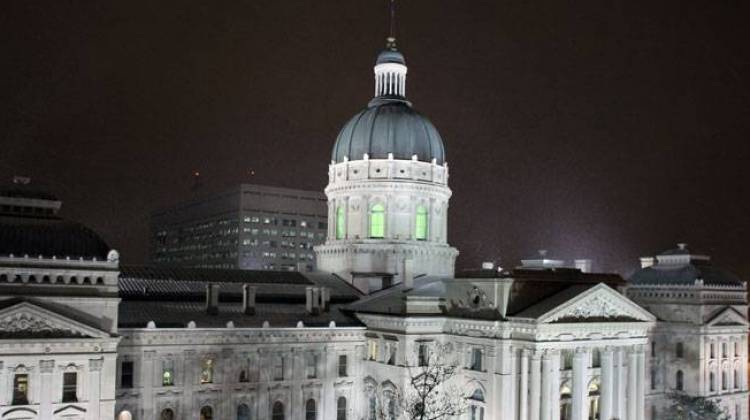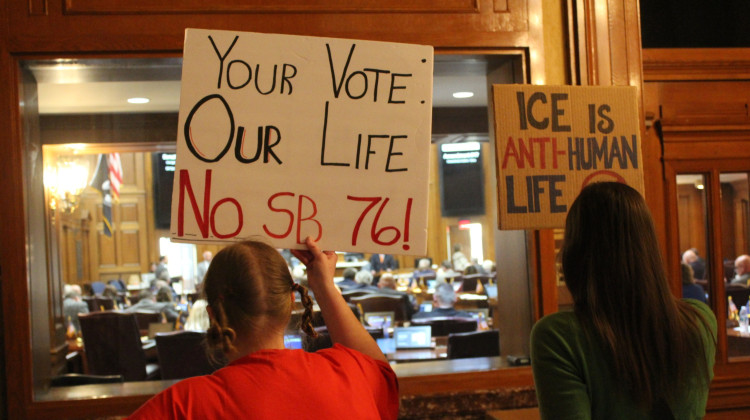After three and a half hours of heated testimony and debate, a House committee postponed a vote Monday on a proposed constitutional amendment to define marriage as the union of a man and woman.
Judiciary Committee Chairman Greg Steuerwald, R-Avon, said he doesn’t know if a majority of committee members plans to approve House Joint Resolution 3 and has not decided when the committee will reconvene.
Much of Monday’s testimony addressed the potential economic impact of the amendment, which has already passed the General Assembly once but must be approved again this year to go on the November ballot for ratification.
Executives from Indiana University, Cummins, and Eli Lilly & Co. testified against both HJR 3 and its accompanying legislation – House Bill 1153 – which is meant to clarify what lawmakers intend with the amendment.
Steve Fry, vice president of human resources and diversity at Lilly, said his company would be severely affected by the passage of HJR-3 because it will hurt the company’s ability to recruit and keep a high quality workforce. He said passage of HJR-3 would “harm the reputation of our great state.”
“This legislation is bad for Indiana, and certainly bad for business in Indiana,” Fry said.
Fry also said recruitment and hiring at Lily would be inhibited even by the public discussion, regardless of how a vote in November turned out.
“It actually matters little how voters will vote on this referendum. The damage to Indiana and our competitiveness will be done,” he said.
Jim Bopp, a Terre Haute attorney and former member of the Republican National Committee, said the idea that the debate on marriage will do damage is “troubling.”
“What does that tell you? That there are some people that are so intolerant of other people’s views that a simple debate about the question offends them to the extent that they want to leave the state,” he said.
“And even more troubling than that is that this is a direct attack upon democracy. You cannot debate and discuss something that some people will be offended by, because they will offended by it?”
Throughout his testimony, Bopp was interrupted several times by laughter from Freedom Indiana supporters seated in the public balcony.
That resulted in a reprimand by Steuerwald, who had already asked for public quiet and respect earlier in the meeting.
Marya Rose, a vice president at Columbus-based Cummins, said passage of the amendment would cause “irreparable harm” to Indiana’s business climate and reputation.
Cummins “will be reluctant to continue to add jobs in Indiana if our state is a less welcoming and inclusive place for all our employees,” she said.
But Rep. Eric Turner, R-Cicero, an author of the amendment, cited statistics he said showed business officials were wrong in their analyses.
“Eight of the top nine states with the highest rate of job growth in the private sector have an amendment to define marriage,” Turner said.
According to Turner, the four states with the highest gross domestic product per capita – as well as four of the top five fasting-growing per capita income states – all have an amendment to protect their states’ definitions of marriage as one man and one woman.
Micah Clark, executive director of the American Family Association of Indiana, echoed Turner’s sentiments and called the claims of economic harm a make-believe “boogeyman.” He said North Carolina – the most recent state to pass a marriage amendment in 2012 – has experienced economic gains in the calendar year since the 2012 passage of its amendment.
Clark cited the North Carolina Chamber of Commerce saying, “business investment increased more than 4 percent, unemployment dropped, and the state added more than 42,000 new jobs after voting to protect marriage.”
Some of Monday’s testimony focused on the second part of the amendment. The first part defines marriage. The second prohibits the legislature from creating any legal status for same-sex couples that is identical or substantially similar to marriage.
Jackie Simmons, vice president and general counsel for IU, said passage of the amendment would directly affect the school’s ability to recruit and maintain its staff of more than 40,000 Hoosiers. She said her key concern is the second sentence.
Kentucky has a constitutional provision that is identical in language to HJR 3. In 2004, the Kentucky attorney general issued an opinion that schools would not be allowed to issue partner benefits because that created a violation of the amendment.
Simmons cited this case as cause for concern at IU, which offers domestic partnership benefits.
However, Bopp said that the University of Kentucky began issuing partner benefits in 2007 and the practice has not been challenged.
Turner said the amendment would not affect the ability for Indiana University, Lilly, Cummins, or anyone else to offer benefits to their employees.
There was also significant debate about the necessity of HB 1153, the companion bill.
Peter Rusthoven, an attorney representing Freedom Indiana, which opposes the amendment, said state law – and the constitution – should be “certain” and the proposed amendment, specifically the second sentence, “creates substantial uncertainty.”
Rusthoven, who gave what he called “a perspective of conservative jurisprudence,” said the passage of HJR-3 would be “turning over future decisions of what will and will not be recognized over to the courts.”
Turner and other supporters said they recognized the certainty of litigation – regardless of whether the amendment passed – but said the decision should ultimately be up to the resident of Indiana.
“The future of marriage belongs in the hands of Hoosiers, not judges, not activists,” Turner said.
He said this is an issue that every state has faced, with 35 states allowing their citizens to vote and decide the issue. The amendment passed in 29 of these states.
Turner said it is time to put the debate to rest and let Hoosiers vote because, “there’s only one true poll… and that’s on November 4, 2014.”
John Sittler is a reporter for TheStatehouseFile.com, a news website powered by Franklin College journalism students.
 DONATE
DONATE








 Support WFYI. We can't do it without you.
Support WFYI. We can't do it without you.